
People smuggling, under U.S. law, is "the facilitation, transportation, attempted transportation or illegal entry of a person or persons across an international border, in violation of one or more countries' laws, either clandestinely or through deception, such as the use of fraudulent documents".
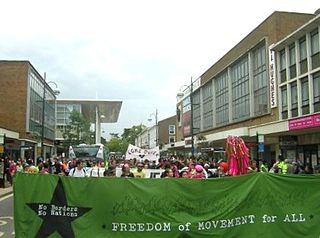
The No Border Network refers to loose associations of autonomous organisations, groups, and individuals in Western Europe, Central Europe, Eastern Europe and beyond. They support freedom of movement and resist human migration control by coordinating international border camps, demonstrations, direct actions, and anti-deportation campaigns.
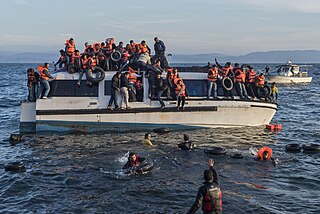
Forced displacement is an involuntary or coerced movement of a person or people away from their home or home region. The UNHCR defines 'forced displacement' as follows: displaced "as a result of persecution, conflict, generalized violence or human rights violations".
Since 1945, immigration to the United Kingdom, controlled by British immigration law and to an extent by British nationality law, has been significant, in particular from the Republic of Ireland and from the former British Empire, especially India, Bangladesh, Pakistan, the Caribbean, South Africa, Nigeria, Ghana, Kenya, and Hong Kong. Since the accession of the UK to the European Communities in the 1970s and the creation of the EU in the early 1990s, immigrants relocated from member states of the European Union, exercising one of the European Union's Four Freedoms. In 2021, since Brexit came into effect, previous EU citizenship's right to newly move to and reside in the UK on a permanent basis does not apply anymore. A smaller number have come as asylum seekers seeking protection as refugees under the United Nations 1951 Refugee Convention.

Immigration is the international movement of people to a destination country of which they are not usual residents or where they do not possess nationality in order to settle as permanent residents. Commuters, tourists, and other short-term stays in a destination country do not fall under the definition of immigration or migration; seasonal labour immigration is sometimes included, however.

Foreign nationals (aliens) can violate US immigration laws by entering the United States unlawfully or lawfully entering but then remaining after the expiration of their visas, parole, or temporary protected status. Illegal immigration has been a matter of intense debate in the United States since the 1980s.
African immigrants in Europe are individuals residing in Europe who were born in Africa. This includes both individuals born in North Africa and Sub-Saharan Africa.
Opposition to immigration, also known as anti-immigration, is a political ideology that seeks to restrict the incoming of people from one area to another. In the modern sense, immigration refers to the entry of people from one state or territory into another state or territory in which they are not citizens in contrast, but closely correspond to emigration which refers people leaving one state or territory in which they are citizens. Illegal immigration occurs when people immigrate to a country without having official permission to do so. Opposition to immigration ranges from calls for various immigration reforms, to proposals to completely restrict immigration, to calls for repatriation of existing immigrants.
Illegal immigration is the migration of people into a country in violation of that country's immigration laws, or the continuous residence in a country without the legal right to. Illegal immigration tends to be financially upward, from poorer to richer countries. Illegal residence in another country creates the risk of detention, deportation, and/or other sanctions.
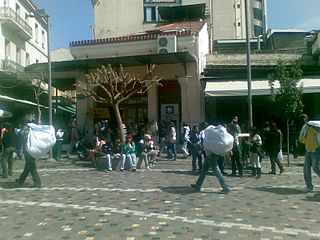
Immigration to Greece percentage of foreign populations in Greece is 7.1% in proportion to the total population of the country. Moreover, between 9 and 11% of the registered Greek labor force of 4.4 million are foreigners. Migrants additionally make up 25% of wage and salary earners.
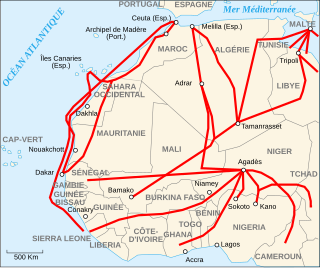
Migrants' routes encompass the primary geographical routes from tropical Africa to Europe, which individuals undertake in search of residence and employment opportunities not available in their home countries. While Europe remains the predominant destination for most migrants, alternate routes also direct migrants towards South Africa and Asia.

An open border is a border that enables free movement of people between jurisdictions with no restrictions on movement and is lacking substantive border control. A border may be an open border due to intentional legislation allowing free movement of people across the border, or a border may be an open border due to a lack of legal controls, a lack of adequate enforcement or adequate supervision of the border. An example of the former is the Schengen Agreement between most members of the European Economic Area. An example of the latter has been the border between Bangladesh and India, which is becoming controlled. The term "open borders" applies only to the flow of people, not the flow of goods and services, and only to borders between political jurisdictions, not to mere boundaries of privately owned property.
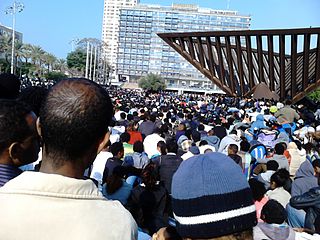
African immigration to Israel is the international movement to Israel from Africa of people that are not natives or do not possess Israeli citizenship in order to settle or reside there. This phenomenon began in the second half of the 2000s, when a large number of people from Africa entered Israel, mainly through the then-lightly fenced border between Israel and Egypt in the Sinai Peninsula. According to the data of the Israeli Interior Ministry, 26,635 people arrived illegally in this way by July 2010, and over 55,000 by January 2012. In an attempt to curb the influx, Israel constructed the Egypt–Israel barrier. Since its completion in December 2013, the barrier has almost completely stopped the immigration of Africans into Israel across the Sinai border.
Migrant sex work is sex work done by migrant workers. It is significant because of its role as a dominant demographic of sex work internationally. It has common features across various contexts, such as migration from rural to urban areas and from developing to industrialized nations, and the economic factors that help to determine migrant status. Migrant sex workers have also been the subject of discussions concerning the legality of sex work, its connection to sex trafficking, and the views of national governments and non-governmental organizations about the regulation of sex work and the provision of services for victims of sex trafficking.
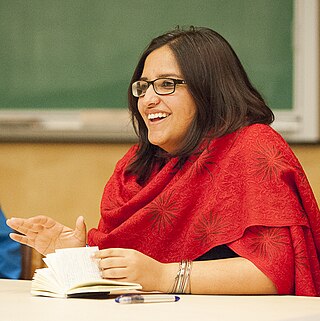
Harsha Walia is a Canadian activist and writer based in Vancouver. She has been involved with No one is illegal, the February 14 Women's Memorial March Committee, the Downtown Eastside Women's Centre, and several Downtown Eastside housing justice coalitions. Walia has been active in immigration politics, Indigenous rights, feminist, anti-racist, anti-statist, and anti-capitalist movements for over a decade.
An illegal immigrant in India is a foreigner who has entered India either without valid documents or who initially had a valid document, but has overstayed beyond the permitted time, as per the general provisions of the Citizenship Act as amended in 2003. Such persons are not eligible for citizenship by registration or naturalisation. They are also liable to be imprisoned for 2–8 years and fined.

Voluntary return or voluntary repatriation is usually the return of an illegal immigrant or over-stayer, a rejected asylum seeker, a refugee or displaced person, or an unaccompanied minor; sometimes it is the emigration of a second-generation immigrant who makes an autonomous decision to return to their ethnic homeland when they are unable or unwilling to remain in the host country.
The "Einheitsfrontlied" is one of the most famous songs of the German labour movement. It was written by Bertolt Brecht and composed by Hanns Eisler. The best-known rendition was sung by Ernst Busch.
The migration and asylum policy of the European Union is within the area of freedom, security and justice, established to develop and harmonise principles and measures used by member countries of the European Union to regulate migration processes and to manage issues concerning asylum and refugee status in the European Union.
Externalization describes the efforts of wealthy, developed countries to prevent asylum seekers and other migrants from reaching their borders, often by enlisting third countries or private entities. Externalization is used by Australia, Canada, the United States, the European Union and the United Kingdom. Although less visible than physical barriers at international borders, externalization controls or restrict mobility in ways that are out of sight and far from the country's border. Examples include visa restrictions, sanctions for carriers who transport asylum seekers, and agreements with source and transit countries. Consequences often include increased irregular migration, human smuggling, and border deaths.














